Unit1 Topic2 I'll kick you the ball again Section B 课件 (共22张PPT)
文档属性
| 名称 | Unit1 Topic2 I'll kick you the ball again Section B 课件 (共22张PPT) |
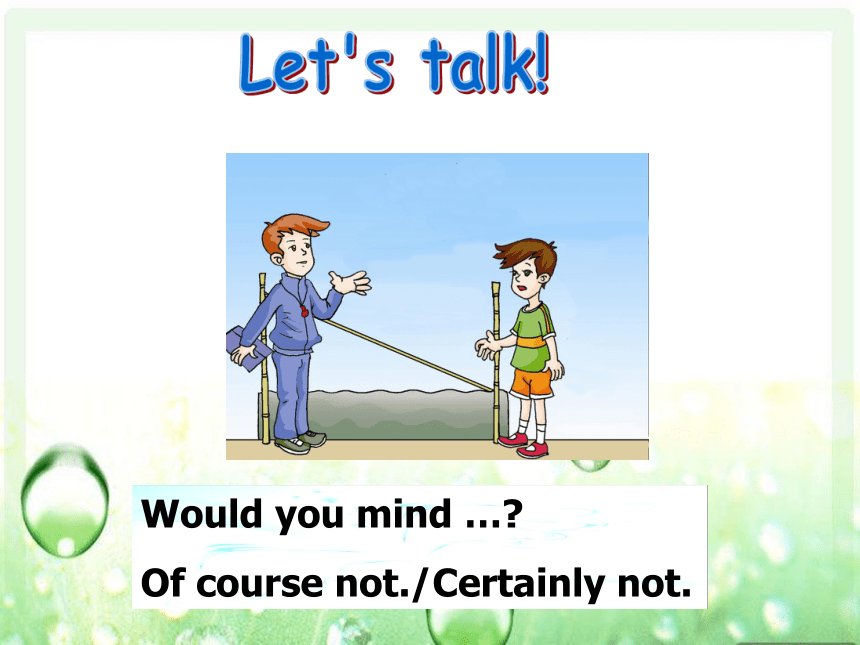
|
|
| 格式 | ppt | ||
| 文件大小 | 4.3MB | ||
| 资源类型 | 教案 | ||
| 版本资源 | 仁爱科普版 | ||
| 科目 | 英语 | ||
| 更新时间 | 2021-08-30 00:00:00 | ||
图片预览

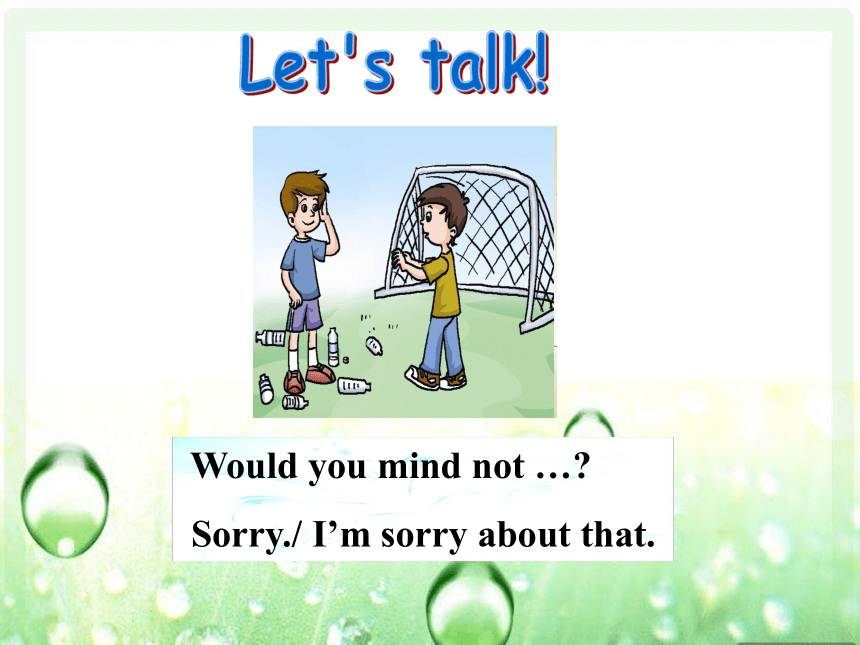
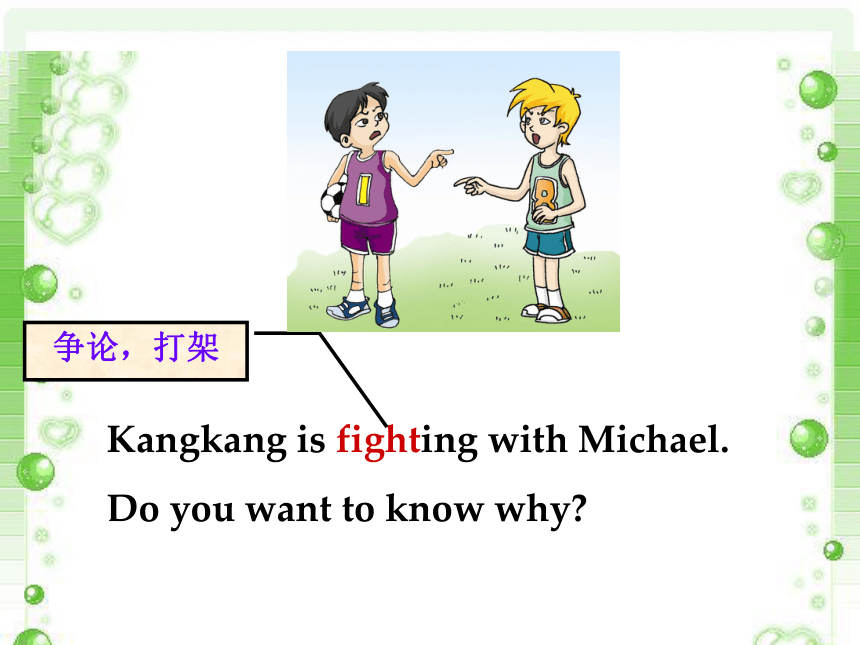
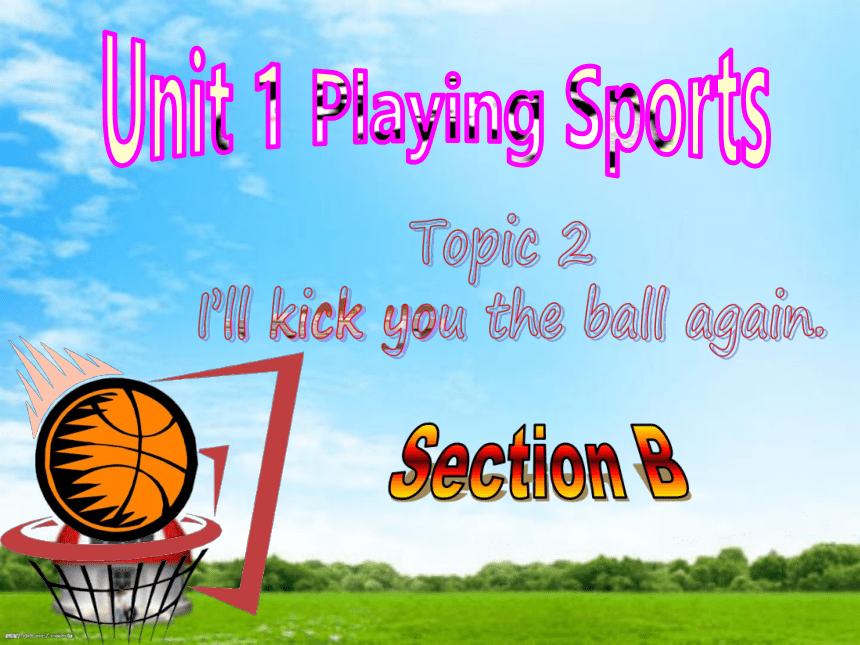
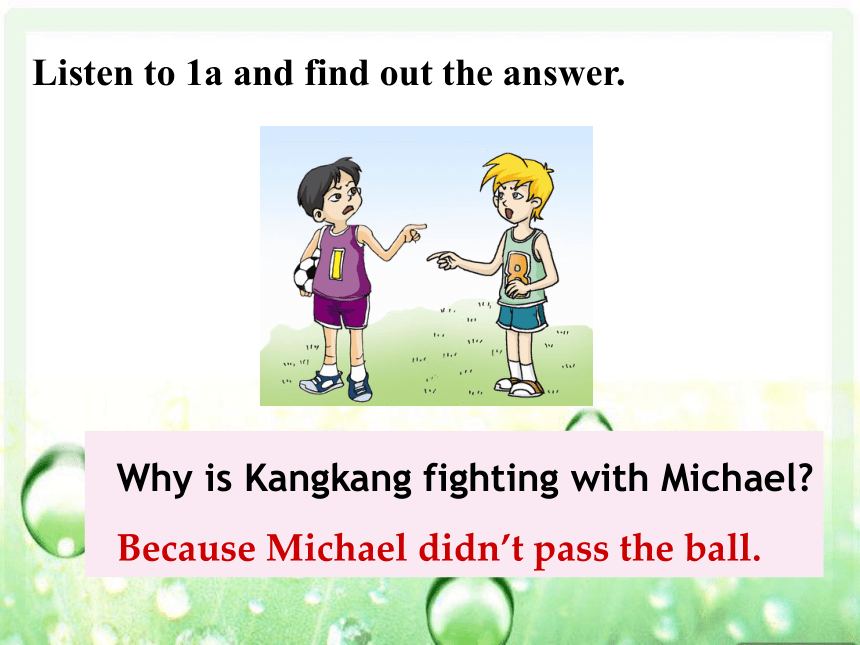
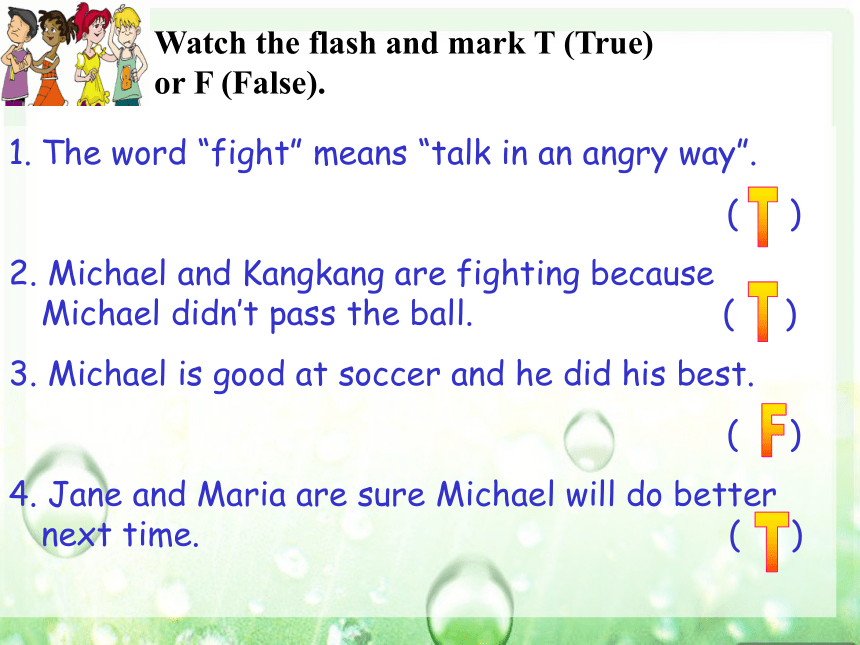
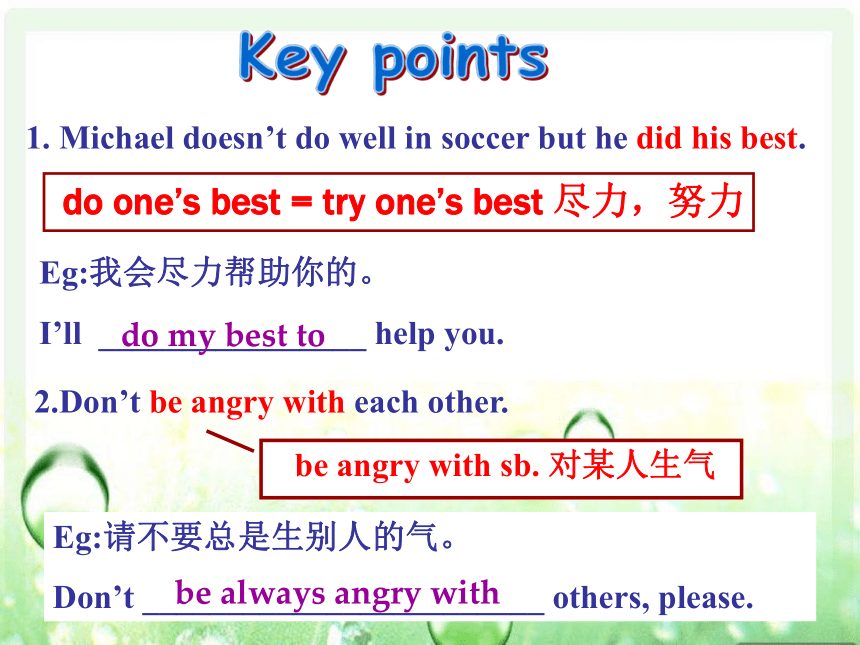
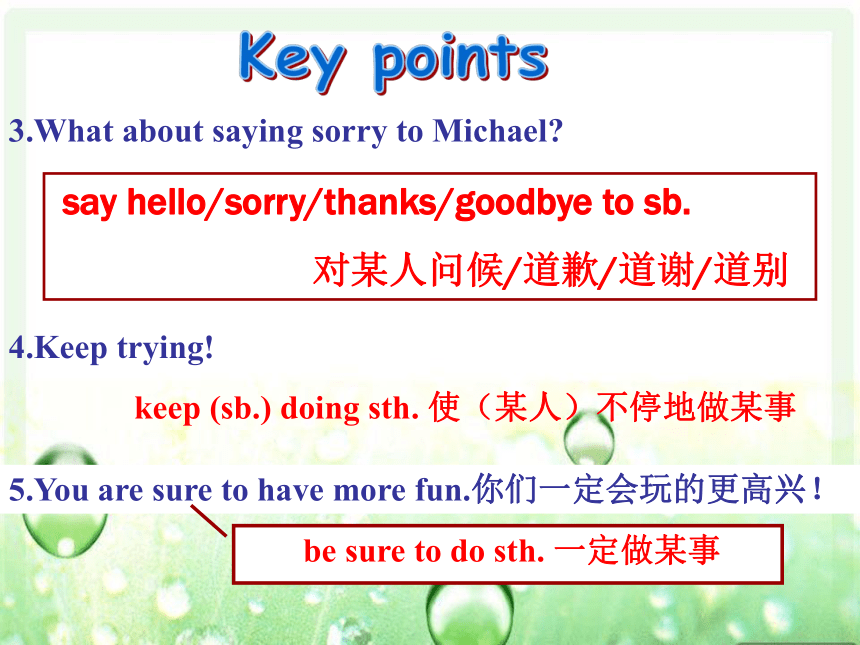
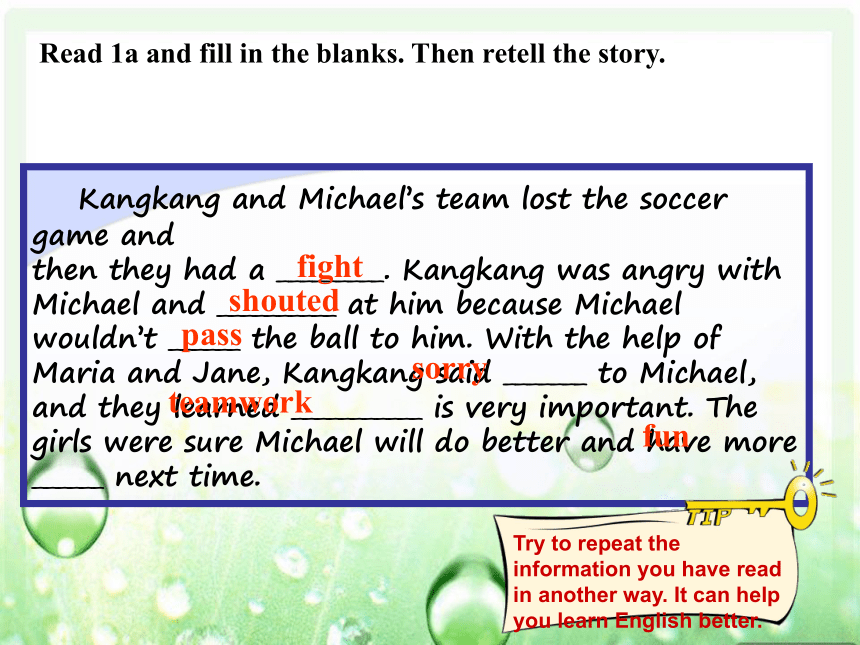
文档简介
(共22张PPT)
Would
you
mind
…?
Of
course
not./Certainly
not.
Would
you
mind
not
…?
Sorry./
I’m
sorry
about
that.
Kangkang
is
fighting
with
Michael.
Do
you
want
to
know
why?
争论,打架
Listen
to
1a
and
find
out
the
answer.
Why
is
Kangkang
fighting
with
Michael?
Because
Michael
didn’t
pass
the
ball.
Watch
the
flash
and
mark
T
(True)
or
F
(False).
The
word
“fight”
means
“talk
in
an
angry
way”.
(
)
2.
Michael
and
Kangkang
are
fighting
because
Michael
didn’t
pass
the
ball.
(
)
3.
Michael
is
good
at
soccer
and
he
did
his
best.
(
)
4.
Jane
and
Maria
are
sure
Michael
will
do
better
next
time.
(
)
1.
Michael
doesn’t
do
well
in
soccer
but
he
did
his
best.
do
one’s
best
=
try
one’s
best
尽力,努力
Eg:我会尽力帮助你的。
I’ll
________________
help
you.
do
my
best
to
2.Don’t
be
angry
with
each
other.
be
angry
with
sb.
对某人生气
Eg:请不要总是生别人的气。
Don’t
________________________
others,
please.
be
always
angry
with
3.What
about
saying
sorry
to
Michael?
say
hello/sorry/thanks/goodbye
to
sb.
对某人问候/道歉/道谢/道别
4.Keep
trying!
keep
(sb.)
doing
sth.
使(某人)不停地做某事
5.You
are
sure
to
have
more
fun.你们一定会玩的更高兴!
be
sure
to
do
sth.
一定做某事
Kangkang
and
Michael’s
team
lost
the
soccer
game
and
then
they
had
a
_________.
Kangkang
was
angry
with
Michael
and
__________
at
him
because
Michael
wouldn’t
______
the
ball
to
him.
With
the
help
of
Maria
and
Jane,
Kangkang
said
_______
to
Michael,
and
they
learned
___________
is
very
important.
The
girls
were
sure
Michael
will
do
better
and
have
more
______
next
time.
fight
Read
1a
and
fill
in
the
blanks.
Then
retell
the
story.
shouted
pass
sorry
teamwork
Try
to
repeat
the
information
you
have
read
in
another
way.
It
can
help
you
learn
English
better.
fun
Please
retell
the
story
with
the
following
words.
lost,
shout
at,
fight,
do
his
best,
teamwork,
be
angry
with,
sorry,
better,
win
Match
the
verbs
in
Box
A
with
the
words
in
Box
B
to
make
phrases.
A
do
say
talk
shout
be
have
try
B
angry
with
fun
at
well
in
about
one’s
best
sorry
to
Phrase
do
well
in
say
sorry
to
talk
about
shout
at
be
angry
with
have
fun
try
one’s
best
Then
use
the
correct
forms
of
phrases
to
complete
the
sentences.
I’ll
__________
to
finish
my
homework
on
time.
They
want
to
keep
trying
and
__________
math
next
time.
She
was
angry
and
said,
“Don’t
__________
me!”
He
was
late
again.
His
teacher
_____________
him.
Mr.
Smith
is
____________
the
football
game
with
his
teammates.
Kangkang
should
____________
Michael.
We
______
a
lot
of
______
at
Sally’s
birthday
party.
try
my
best
do
better
in
shout
at
was
angry
with
talking
about
say
sorry
to
had
fun
Study
the
example
and
rewrite
the
following
sentences.
Example:
Please
give
me
the
book.
=
Please
give
the
book
to
me.
give
+
+
=
give
+
+
to
+
direct
object
直接宾语
indirect
object
间接宾语
Study
the
example
and
rewrite
the
following
sentences.
You
can
also
pass
a
teammate
the
ball.
Please
throw
me
the
ball.
My
dad
bought
a
basketball
for
my
brother.
Bring
Peter
a
present.
I
made
a
big
cake
for
my
grandfather.
You
can
also
pass
the
ball
to
a
teammate.
Please
throw
the
ball
to
me.
My
dad
bought
my
brother
a
basketball.
Bring
a
present
for
Peter.
I
made
my
grandfather
a
big
cake.
1.
—
Could
you
please
______
me
around?
---Sorry,
I
won’t.
not
to
follow
B.
follow
C.
not
following
D.
not
follow
2.
—
Would
you
mind
_____
the
windows
for
me?
I
feel
a
little
cold.
—No,
of
course
not.
opening
B.
closing
C.
to
open
D.
to
close
3.
I
was
really
angry
_____
Mike.
He
kept
me
waiting
for
an
hour.
with
B.
to
C.
for
D.
in
We
learn:
1.
Phrases:
擅长于:do
well
in
向……道歉:say
sorry
to
谈论:
talk
about
大声斥责:shout
at
对……生气:be
angry
with
玩得开心:have
fun
尽最大努力:try
one’s
best
2.
Sentences
with
direct
and
indirect
object
structure
Li
Lei
did
his
best
to
study
hard,
but
he
didn’t
pass
the
exam.
do
one’s
best
尽(某人)最大努力
His
father
is
angry
with
him.
His
mother
is
shouting
at
him.
对某人生气
斥责某人
4a
Read
the
pairs
of
words
and
pay
attention
to
the
difference
between
/e/
and
/aI/.
/e/--
/aI/
press----price
smell----smile
net----night
said----side
4b
Listen
and
read
the
sentences
aloud,
paying
attention
to
the
pronunciation
and
incomplete
plosion.
She
is
going
to
ta(k)e
part
in
the
sports
mee(t)
nex(t)
weekend.
A:
Michael,
we
los(t)
because
you
wouldn’(t)
pass
the
ball.
B:
Don’(t)
shou(t)
at
me
li(k)e
that.
3.
A:
Would
you
min(d)
no(t)
throwing
bottles
around?
B:
I’m
sorry
abou(t)
that.
I
won’(t)
do
it
again.
4.
A:
Sorry,
I
misse(d)
the
ball.
B:
Never
mind.
Kee(p)
trying,
I’ll
kic(k)
you
the
ball
again.
The
consonants
in
brackets
here
are
usually
pronounced
as
stops
like
t,
d,
p,
b,
k
and
g.
用今天所学的短语造句,写在作业本上。
背诵1a。
Would
you
mind
…?
Of
course
not./Certainly
not.
Would
you
mind
not
…?
Sorry./
I’m
sorry
about
that.
Kangkang
is
fighting
with
Michael.
Do
you
want
to
know
why?
争论,打架
Listen
to
1a
and
find
out
the
answer.
Why
is
Kangkang
fighting
with
Michael?
Because
Michael
didn’t
pass
the
ball.
Watch
the
flash
and
mark
T
(True)
or
F
(False).
The
word
“fight”
means
“talk
in
an
angry
way”.
(
)
2.
Michael
and
Kangkang
are
fighting
because
Michael
didn’t
pass
the
ball.
(
)
3.
Michael
is
good
at
soccer
and
he
did
his
best.
(
)
4.
Jane
and
Maria
are
sure
Michael
will
do
better
next
time.
(
)
1.
Michael
doesn’t
do
well
in
soccer
but
he
did
his
best.
do
one’s
best
=
try
one’s
best
尽力,努力
Eg:我会尽力帮助你的。
I’ll
________________
help
you.
do
my
best
to
2.Don’t
be
angry
with
each
other.
be
angry
with
sb.
对某人生气
Eg:请不要总是生别人的气。
Don’t
________________________
others,
please.
be
always
angry
with
3.What
about
saying
sorry
to
Michael?
say
hello/sorry/thanks/goodbye
to
sb.
对某人问候/道歉/道谢/道别
4.Keep
trying!
keep
(sb.)
doing
sth.
使(某人)不停地做某事
5.You
are
sure
to
have
more
fun.你们一定会玩的更高兴!
be
sure
to
do
sth.
一定做某事
Kangkang
and
Michael’s
team
lost
the
soccer
game
and
then
they
had
a
_________.
Kangkang
was
angry
with
Michael
and
__________
at
him
because
Michael
wouldn’t
______
the
ball
to
him.
With
the
help
of
Maria
and
Jane,
Kangkang
said
_______
to
Michael,
and
they
learned
___________
is
very
important.
The
girls
were
sure
Michael
will
do
better
and
have
more
______
next
time.
fight
Read
1a
and
fill
in
the
blanks.
Then
retell
the
story.
shouted
pass
sorry
teamwork
Try
to
repeat
the
information
you
have
read
in
another
way.
It
can
help
you
learn
English
better.
fun
Please
retell
the
story
with
the
following
words.
lost,
shout
at,
fight,
do
his
best,
teamwork,
be
angry
with,
sorry,
better,
win
Match
the
verbs
in
Box
A
with
the
words
in
Box
B
to
make
phrases.
A
do
say
talk
shout
be
have
try
B
angry
with
fun
at
well
in
about
one’s
best
sorry
to
Phrase
do
well
in
say
sorry
to
talk
about
shout
at
be
angry
with
have
fun
try
one’s
best
Then
use
the
correct
forms
of
phrases
to
complete
the
sentences.
I’ll
__________
to
finish
my
homework
on
time.
They
want
to
keep
trying
and
__________
math
next
time.
She
was
angry
and
said,
“Don’t
__________
me!”
He
was
late
again.
His
teacher
_____________
him.
Mr.
Smith
is
____________
the
football
game
with
his
teammates.
Kangkang
should
____________
Michael.
We
______
a
lot
of
______
at
Sally’s
birthday
party.
try
my
best
do
better
in
shout
at
was
angry
with
talking
about
say
sorry
to
had
fun
Study
the
example
and
rewrite
the
following
sentences.
Example:
Please
give
me
the
book.
=
Please
give
the
book
to
me.
give
+
+
=
give
+
+
to
+
direct
object
直接宾语
indirect
object
间接宾语
Study
the
example
and
rewrite
the
following
sentences.
You
can
also
pass
a
teammate
the
ball.
Please
throw
me
the
ball.
My
dad
bought
a
basketball
for
my
brother.
Bring
Peter
a
present.
I
made
a
big
cake
for
my
grandfather.
You
can
also
pass
the
ball
to
a
teammate.
Please
throw
the
ball
to
me.
My
dad
bought
my
brother
a
basketball.
Bring
a
present
for
Peter.
I
made
my
grandfather
a
big
cake.
1.
—
Could
you
please
______
me
around?
---Sorry,
I
won’t.
not
to
follow
B.
follow
C.
not
following
D.
not
follow
2.
—
Would
you
mind
_____
the
windows
for
me?
I
feel
a
little
cold.
—No,
of
course
not.
opening
B.
closing
C.
to
open
D.
to
close
3.
I
was
really
angry
_____
Mike.
He
kept
me
waiting
for
an
hour.
with
B.
to
C.
for
D.
in
We
learn:
1.
Phrases:
擅长于:do
well
in
向……道歉:say
sorry
to
谈论:
talk
about
大声斥责:shout
at
对……生气:be
angry
with
玩得开心:have
fun
尽最大努力:try
one’s
best
2.
Sentences
with
direct
and
indirect
object
structure
Li
Lei
did
his
best
to
study
hard,
but
he
didn’t
pass
the
exam.
do
one’s
best
尽(某人)最大努力
His
father
is
angry
with
him.
His
mother
is
shouting
at
him.
对某人生气
斥责某人
4a
Read
the
pairs
of
words
and
pay
attention
to
the
difference
between
/e/
and
/aI/.
/e/--
/aI/
press----price
smell----smile
net----night
said----side
4b
Listen
and
read
the
sentences
aloud,
paying
attention
to
the
pronunciation
and
incomplete
plosion.
She
is
going
to
ta(k)e
part
in
the
sports
mee(t)
nex(t)
weekend.
A:
Michael,
we
los(t)
because
you
wouldn’(t)
pass
the
ball.
B:
Don’(t)
shou(t)
at
me
li(k)e
that.
3.
A:
Would
you
min(d)
no(t)
throwing
bottles
around?
B:
I’m
sorry
abou(t)
that.
I
won’(t)
do
it
again.
4.
A:
Sorry,
I
misse(d)
the
ball.
B:
Never
mind.
Kee(p)
trying,
I’ll
kic(k)
you
the
ball
again.
The
consonants
in
brackets
here
are
usually
pronounced
as
stops
like
t,
d,
p,
b,
k
and
g.
用今天所学的短语造句,写在作业本上。
背诵1a。
同课章节目录
- Unit 1 Playing Sports
- Topic 1 I'm going to play basketball.
- Topic 2 I'll kick you the ball again.
- Topic 3 The school sports meet is coming.
- Unit 2 Keeping Healthy
- Topic 1 You should brush your teeth twice a day.
- Topic 2 I must ask him to give up smoking.
- Topic 3 Must we exercise to prevent the flu?
- Unit 3 Our Hobbies
- Topic 1 What's your hobby?
- Topic 2 What sweet music!
- Topic 3 What were you doing at this time yesterday
- Unit 4 Our World
- Topic 1 What's the strongest animal on the farm?
- Topic 2 How can we protect ourselves from the eart
- Topic 3 The Internet makes the world smaller.
